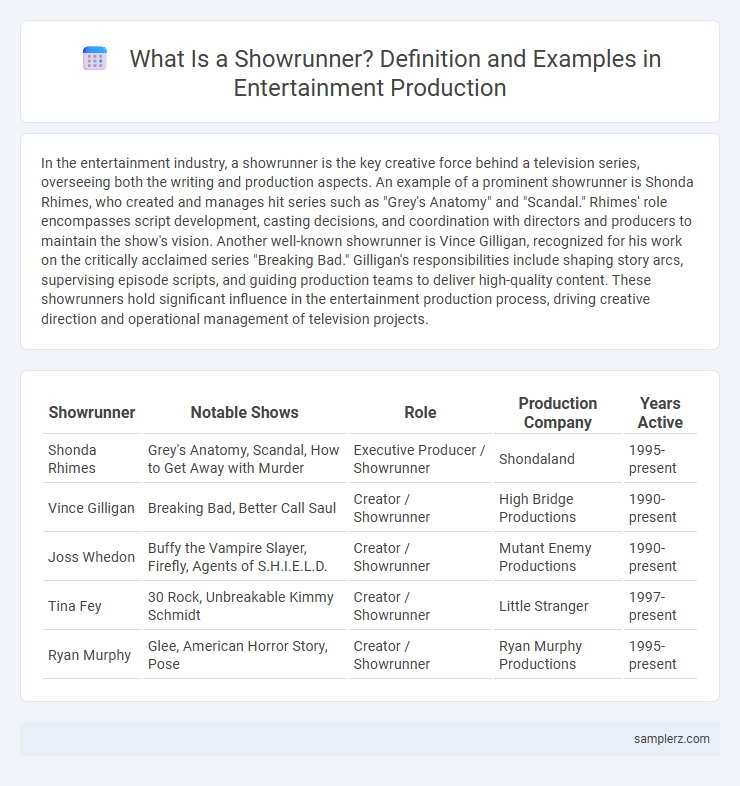In the entertainment industry, a showrunner is the key creative force behind a television series, overseeing both the writing and production aspects. An example of a prominent showrunner is Shonda Rhimes, who created and manages hit series such as "Grey's Anatomy" and "Scandal." Rhimes' role encompasses script development, casting decisions, and coordination with directors and producers to maintain the show's vision. Another well-known showrunner is Vince Gilligan, recognized for his work on the critically acclaimed series "Breaking Bad." Gilligan's responsibilities include shaping story arcs, supervising episode scripts, and guiding production teams to deliver high-quality content. These showrunners hold significant influence in the entertainment production process, driving creative direction and operational management of television projects.
Table of Comparison
| Showrunner | Notable Shows | Role | Production Company | Years Active |
|---|---|---|---|---|
| Shonda Rhimes | Grey's Anatomy, Scandal, How to Get Away with Murder | Executive Producer / Showrunner | Shondaland | 1995-present |
| Vince Gilligan | Breaking Bad, Better Call Saul | Creator / Showrunner | High Bridge Productions | 1990-present |
| Joss Whedon | Buffy the Vampire Slayer, Firefly, Agents of S.H.I.E.L.D. | Creator / Showrunner | Mutant Enemy Productions | 1990-present |
| Tina Fey | 30 Rock, Unbreakable Kimmy Schmidt | Creator / Showrunner | Little Stranger | 1997-present |
| Ryan Murphy | Glee, American Horror Story, Pose | Creator / Showrunner | Ryan Murphy Productions | 1995-present |
Defining the Role of a Showrunner in Entertainment Production
A showrunner in entertainment production is the chief creative authority responsible for overseeing a television series from script development to final editing, ensuring consistent vision and storytelling quality. This role involves managing writing teams, coordinating with directors and producers, and balancing creative decisions with budget constraints and network expectations. Prominent showrunners like Shonda Rhimes and Vince Gilligan exemplify the impact of this position on shaping narrative direction and production efficiency in hit TV series.
Iconic Showrunners Who Changed TV History
Shonda Rhimes revolutionized television with her creation of groundbreaking series like *Grey's Anatomy* and *Scandal*, introducing diverse storytelling and complex characters. Vince Gilligan transformed TV drama through *Breaking Bad*, blending suspense, dark themes, and moral ambiguity. David Chase reshaped narrative depth and character development in *The Sopranos*, setting a new standard for modern television drama.
Behind-the-Scenes: Day-to-Day Duties of a Showrunner
Showrunners oversee the scripting process, manage casting decisions, and coordinate with directors to ensure a cohesive creative vision. They balance creative input with budget constraints, schedule shoots, and resolve conflicts among the production team. Their role demands constant communication with writers, producers, and network executives to keep the show on track and maintain quality standards.
Showrunner Success Stories from Major Productions
Shonda Rhimes reshaped television with hits like "Grey's Anatomy" and "Scandal," showcasing her unparalleled storytelling and masterful team management. Vince Gilligan's creation of "Breaking Bad" earned critical acclaim and multiple awards, setting new standards in narrative complexity and character development. Ava DuVernay broke barriers as a showrunner on "Queen Sugar," highlighting diverse voices and earning accolades for authentic representation.
How Showrunners Shape Creative Direction in Series
Showrunners like Shonda Rhimes and Vince Gilligan exemplify how influential creative leadership steers television series from conceptualization to final production. By overseeing writing, casting, and overall narrative vision, showrunners ensure consistent tone and story depth throughout a show's lifespan. Their unique blend of creative control and management secures a cohesive and engaging viewer experience across episodes and seasons.
Collaboration Between Showrunners, Writers, and Directors
Showrunners like Shonda Rhimes exemplify successful collaboration by integrating the creative visions of writers and directors to maintain narrative consistency and production quality. This teamwork fosters a dynamic environment where writers contribute strong storytelling elements while directors enhance visual storytelling, ensuring cohesive episodes. Effective communication and shared goals among showrunners, writers, and directors streamline decision-making and elevate the overall entertainment value of a television series.
Showrunner Influence: Shaping Casting and Storytelling Choices
Showrunners such as Vince Gilligan of *Breaking Bad* significantly influence casting decisions by selecting actors who embody the nuanced traits of complex characters, ensuring authenticity and emotional depth. Their storytelling choices define the series' tone, pacing, and thematic exploration, directly impacting audience engagement and critical acclaim. Through their creative vision, showrunners orchestrate cohesive narratives that balance character development with plot progression, shaping the overall success of television productions.
Challenges Faced by Showrunners During Production
Showrunners like Vince Gilligan on "Breaking Bad" navigate immense pressure balancing creative vision with network demands, often managing tight budgets and unpredictable shooting schedules. They face challenges coordinating diverse teams, addressing last-minute script changes, and maintaining narrative consistency under time constraints. Maintaining cast cohesion and handling logistical setbacks remain critical hurdles throughout production.
Notable Showrunner-Driven Television Hits
Showrunner Vince Gilligan revolutionized television with "Breaking Bad," blending intricate storytelling and character development to captivate global audiences. Shonda Rhimes created culturally impactful dramas such as "Grey's Anatomy" and "Scandal," showcasing diversity and complex narratives in prime-time TV. David Benioff and D.B. Weiss produced the epic series "Game of Thrones," combining high fantasy and dramatic intrigue, which set new standards for production quality and audience engagement.
The Impact of a Showrunner’s Vision on a Show’s Legacy
A showrunner like Vince Gilligan, who helmed "Breaking Bad," profoundly shapes a show's narrative coherence and character development, ensuring a lasting cultural impact. The showrunner's vision drives creative decisions, influencing the show's tone, pacing, and thematic depth, which resonate with audiences and critics alike. This cohesive leadership often results in enduring fan engagement and critical acclaim, cementing the show's legacy in television history.

example of showrunner in production Infographic
 samplerz.com
samplerz.com